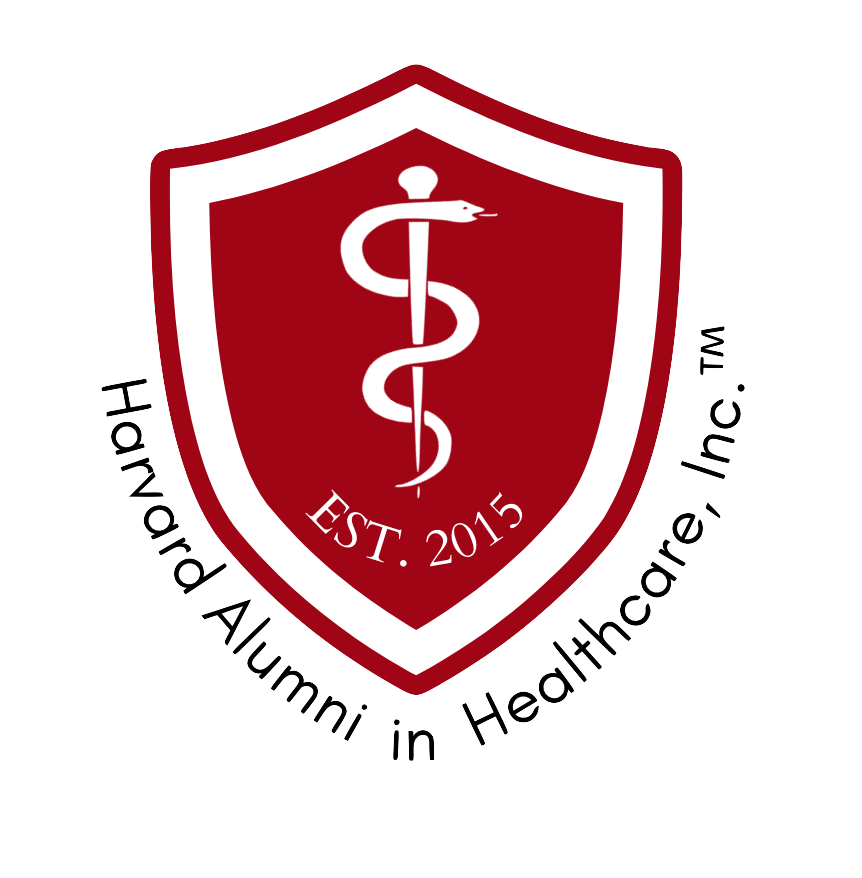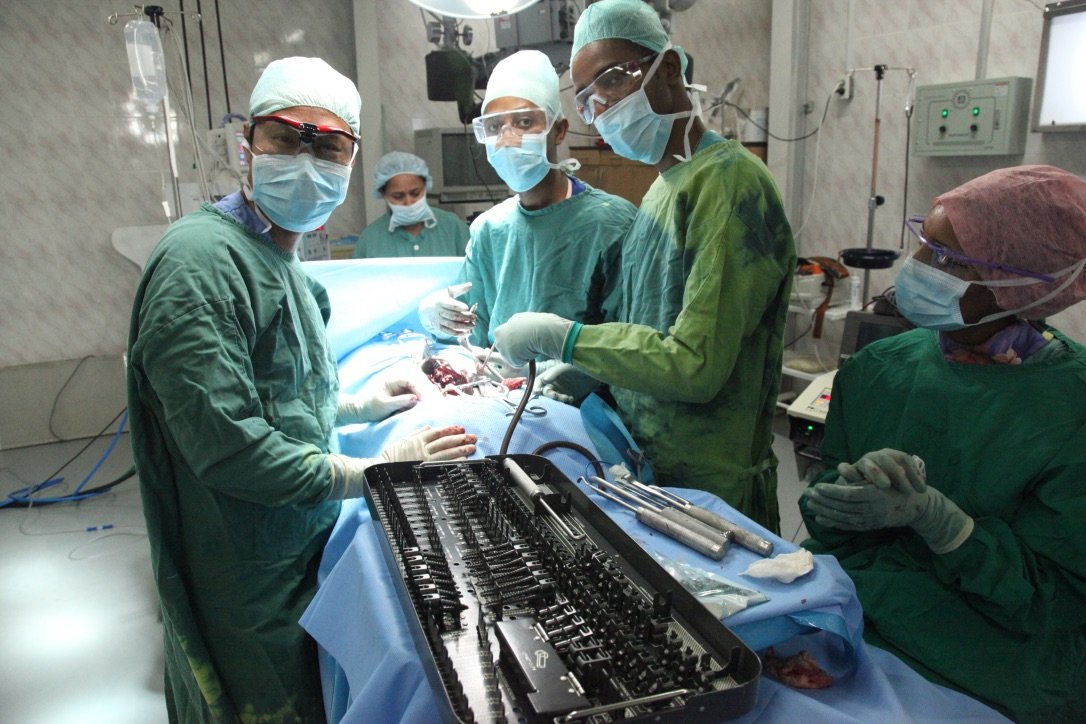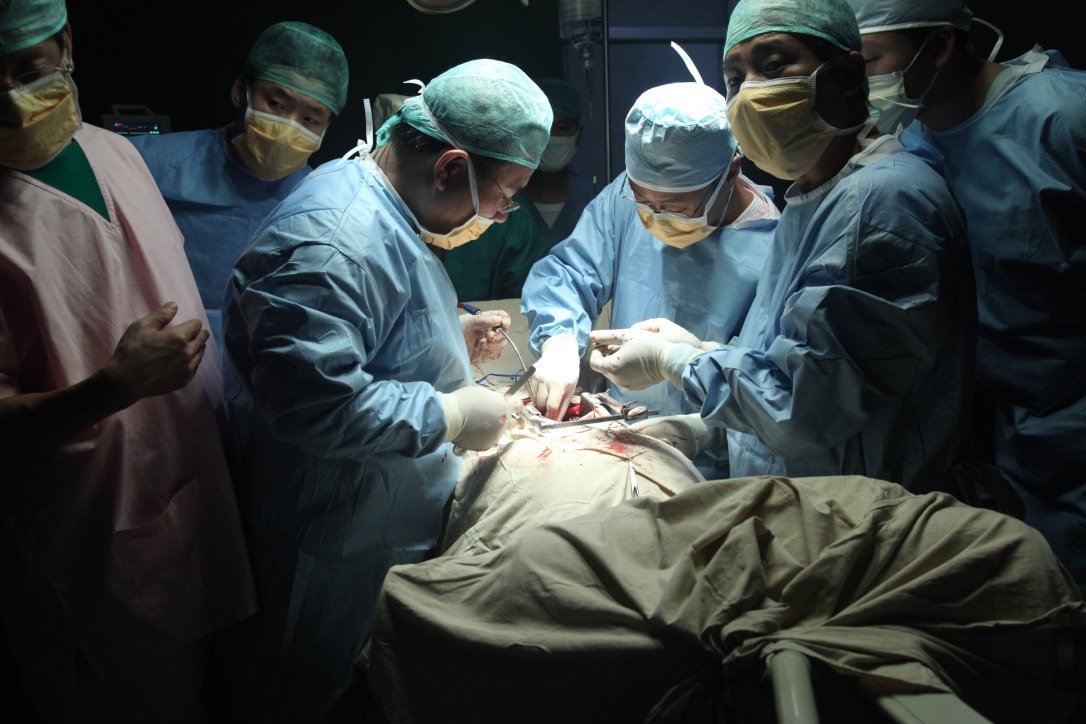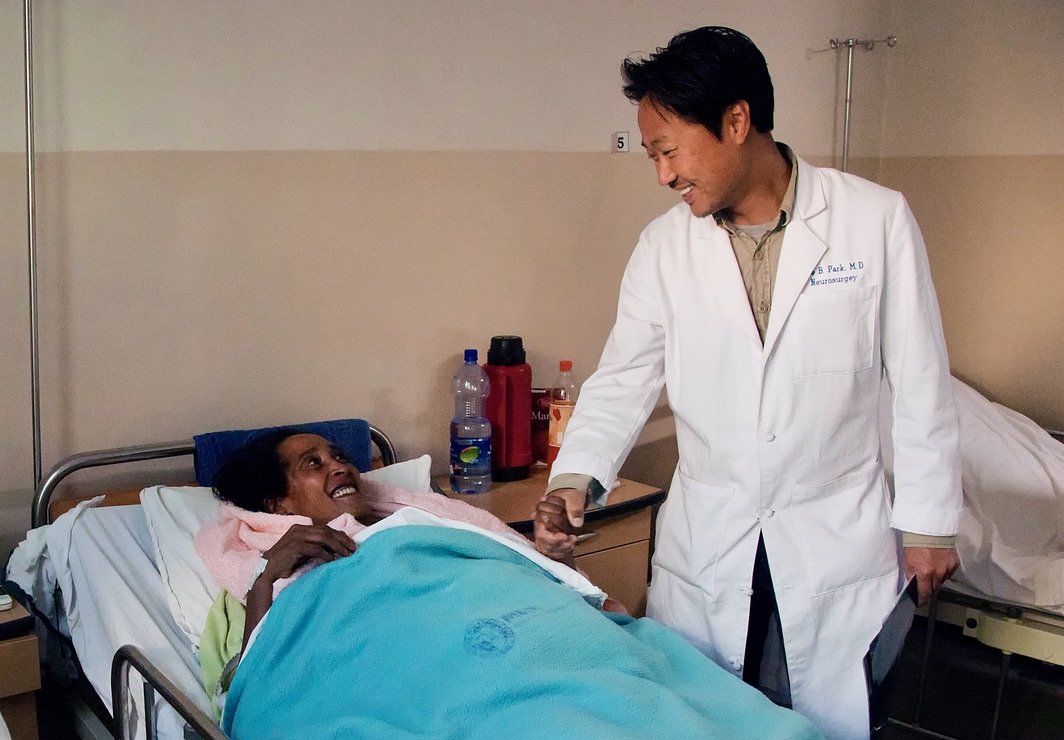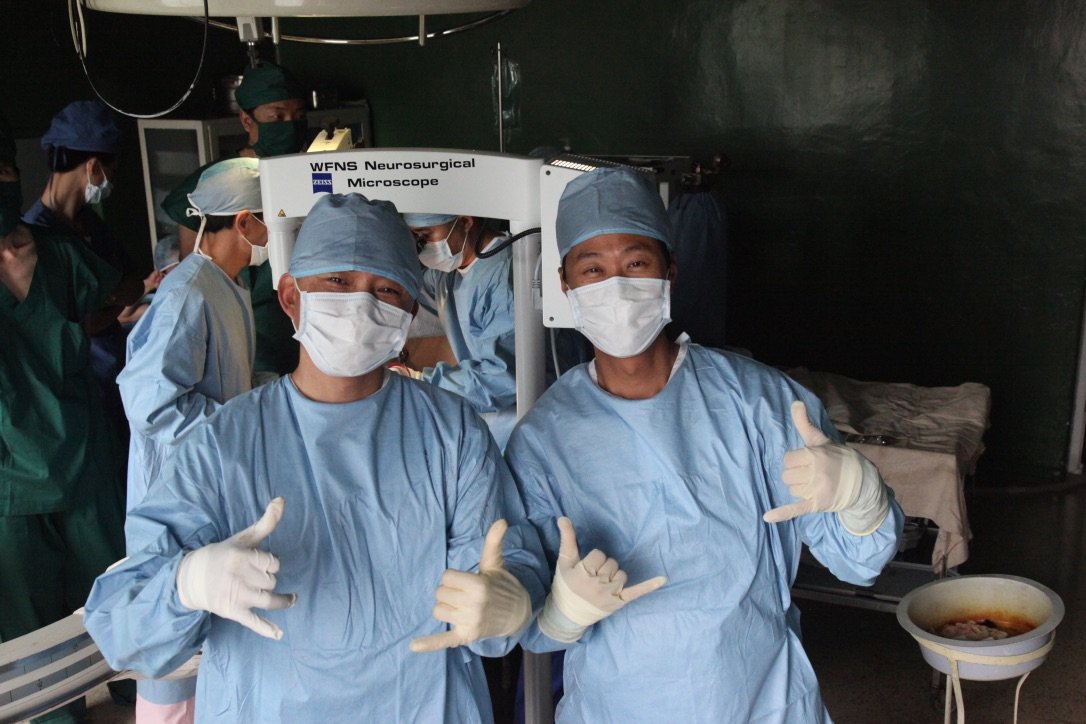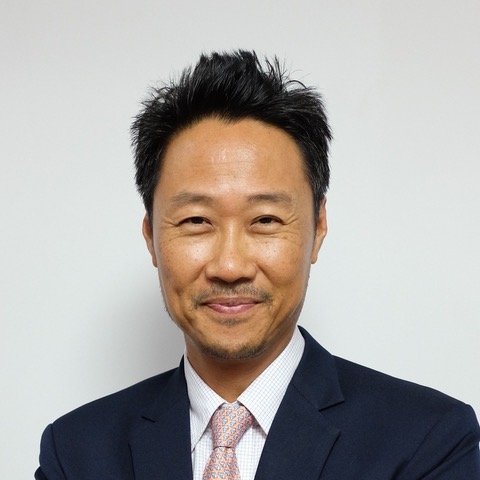Kee B Park MD MPH '19
I’m Kee Park. I’m the Director of Policy and Advocacy at the Program of Global Surgery and Social Change, a program embedded in the Department of Global Health and Social Medicine at Harvard Medical School. Our vision is universal access to surgical care. I also lead the Global Neurosurgery Initiative Team within the program, where we train future leaders in Global Neurosurgery and conduct research into the global public health dimension of neurosurgery. Finally, I’m the Director of the Korea Health Policy Project. I’ve been to North Korea over 20 times and have a North Korean license to practice medicine. I not only work alongside North Korean doctors, but I also have a lab where we study health in North Korea and the role of geopolitical factors that impact the health of North Korean people. Those are the three main hats that I wear.
Can you speak more to your work as an academic and healthcare practitioner in North Korea?
Addis Adaba 2010
We know healthcare is important, but there are so many other factors that could negatively or positively affect the population’s health. For example, in North Korea, the fact that there is an unfinished war has huge implications as far as resources for the country to support healthcare and other social benefits for the population. As such, we look closely at current geopolitical factors [in my lab]; for instance, we examine the international sanctions that have been placed on North Korea as a result of their nuclear weapons and ballistic missile technology development. Though it is explicitly stated that sanctions are not intended to harm the North Korean people, it is clear that they do. Our philosophy is that we should never place innocent people— especially women and children— at risk in the name of national security. [We identify] potential entry points for international actors from South Korea, the United States, and other countries for whom it makes sense to engage in cooperative projects with North Korea. Pre-pandemic, North Korea was prioritizing surgical care, so it makes sense for external actors to partner with North Korea on surgical system strengthening. But right now, protecting its people from the pandemic is their top priority.
How do these experiences looking at healthcare systems in other countries compare with what you have seen in the United States, and what have you taken from them and put into your career today?
Pyongyang 2009
I’m a neurosurgeon. I went to medical school at Robert Wood Johnson in New Jersey, followed by residency in neurosurgery at Temple University Hospital in Philadelphia. I finished residency in 1995 and did private practice for about 12 years until 2007.
Then, I started going overseas and working in countries like Ethiopia, Nepal, North Korea, and finally in Cambodia. My high income country education, training, and environment was my starting point of reference as I embarked on a journey to serve overseas. My first foray was in Ethiopia. My mindset was, “I come from the United States, I’m highly educated, I know what I’m doing; I’m going to teach these people and bring them up to our level.” Looking back, I now know that I had what people call a savior complex. Over the years, I learned that this kind of mindset is neither helpful nor productive.
Phnom Penh 2014
I’ll give you an example: I specialize in spine reconstruction, where we use fancy and expensive screws, rods, and hooks to reconstruct [the spine]. While this is how we treat spine fractures in the United States, there was zero complex spine surgery being done in Ethiopia in 2007. I brought over implant sets from the United States, by asking implant companies to donate some of their sets to go to Ethiopia, which they were willing to do. We did these beautiful surgeries and took pictures with my arms around the patients. We actually published a study to show it is indeed safe and effective to perform complex spine reconstruction surgeries in Ethiopia, leading us to the conclusion that we should do more of these procedures.
The problem is that there’s no sustainable source to continue getting these implants. The other problem came from utilizing multiple different companies’ implants, and 5-10 years from now, if these patients needed additional surgical care, there is no way they would have the right instruments to remove these screws because we used a hodgepodge of different brands. There are some important ethical considerations to this short-sighted approach and we really have to think about what is best for these patients.
There is also a dysfunctional relationship where doctors in a developing country encounter a doctor who speaks English well, is U.S.-educated, and board certified, and willingly give up their authority [to the latter]. I was surprised by the deference I was afforded even though these doctors had so much more experience than I had in caring for their patients. I didn’t ask for it, it was just there. I had to really learn that the power and knowledge differential can be abused.
I worked in Ethiopia for about 6-7 years on and off, going back and forth, and made a lot of mistakes. It soon became clear to me that I would have to leave behind everything I learned and start over. I eventually learned to ask instead, “What does this country really want? In which direction do they want to go? How do they want to go about it?” Then I can come along their side and say, “Here are my skills, how can I fit into your strategy and plans?” That is the best way to approach your partners and support them: they are in charge, bottom line.
Especially considering all these hats that you wear, in what ways do you believe you're able to use your experiences, power, and privilege to make these changes that you believe are necessary— whether it's policy or administrative— for the sustainability of these healthcare systems in other countries and in the United States as well?
Addis Ababa 2010
The U.S. healthcare system is a very unique system because of its reliance on profit-driven motives. The commercial interests are what drives U.S. healthcare and that is the fundamental flaw in our healthcare system; there is a misalignment of incentives. I’ll give you an example: when I was practicing in the United States earlier in my career, patients after surgeries would express to us how much pain they were in following large spine reconstruction surgeries. So, we put them on all kinds of pain medicines— and we used tons of it. Even then, I wasn’t sure if the patients were getting “adequate relief.”
When I went to Ethiopia, these heavy duty narcotics weren’t even available. We would perform these large operations, and as I made rounds on the patients afterwards and asked, “Are you in pain?” they’d respond with, “Of course I am in pain, I just had surgery! But I am OK with what you are giving me.” They were fine with just diclofenac, basically ibuprofen! It truly baffled me, and it wasn’t just Ethiopia, it was the same in Cambodia. It isn’t that we were under medicating Ethiopians and Cambodians— we even performed a study to confirm that the patients thought their pain control was adequate. The problem was that we were overmedicating in the United States. We are only about 4% of the world’s population, but we were using 60-70% of the world’s opiates. And this pain-intolerance throughout the country was in no way inherent to American people— it’s the marketing, done in a way that I wasn’t even aware.
I remember when I was fresh out of residency practicing neurosurgery in Missouri. I received a letter from the State Medical Association saying that we should consider pain as a fifth vital sign. More importantly, it was hinted that if we didn’t ask about a patient’s pain level, we were essentially negligent bordering on malpractice. So we began to ask everyone, “how’s your pain, how’s your pain?” leading us to shift the issue of pain control into a much larger problem than it was before. You can see in the ‘80s and ‘90s that there was a huge surge in the use of opioids in the United States. There was a concerted effort by the pharmaceutical industry to sell more drugs; they had a strategy.
I didn't see all of this when I was a provider in the United States. Once I went overseas, I realized the people that are controlling the U.S. healthcare system are the people sitting in the boardrooms of these pharmaceutical and other healthcare companies. Profit motives are not [only] negatively impacting people’s health, they are literally killing people. Sadly, it’s just acceptable for some of these companies— it’s part of doing business. To be fair, not all healthcare companies place profits above people, but there are too many examples and the system allows it.
What do you think is most valuable to keep in mind or to prioritize for undergraduates who are looking to enter into the healthcare system someday, whether that’s working in the U.S. or going abroad?
Pyongyang 2010
Honestly, you’re asking someone who didn’t take his own advice in college! I didn’t have the focus or clarity to say I was going to study neuroscience. I just studied because I knew getting into medical school was important, that getting into a certain specialty residency is the next step towards what I had understood as American success, things like money, power, and prestige. If you make that your number one goal, which is what I did, you soon realize it’s all one big illusion; it’s an illusion because there’s never enough. The students that I am impressed with are the ones that ask, “what’s my purpose here on Earth?” and see serving others as their reason for being. They seem the happiest and make something meaningful out of their careers.
I was working in Ethiopia, in Cambodia, in a government hospital, genuinely happy. Happy working with my buddies, eating rice noodles everyday, showing them how to perform operations. Then at some point I realized that in order for me to help all patients who needed neurosurgical care, the solution wasn’t going to be training more neurosurgeons. The problem was a public health issue: the health systems weren’t being properly supported and there wasn’t enough money going into them from the governments. So I wanted to approach surgical care at the system level. I came back to the United States in 2016 for a fellowship with the Program in Global Surgery and Social Change and enrolled in the MPH program at the Harvard Chan School. The training and the MPH has changed everything— it has made me a better advocate, a better researcher, and equipped me to continue to better serve those I want to help.
After my degree and fellowship, I was offered a faculty position at the Program in Global Surgery and Social Change. I love my job! I am able to devote full time toward what I’m passionate about: addressing health disparities and making sure people who need healthcare have access that we all take for granted. Now people reach out to me and say, “great job, Kee! We want to hear about your work.” That wasn’t my goal and it still isn’t. Serving others has given me purpose and meaning in my life and I can’t imagine doing anything else.
What drove you to make these larger, more important changes in trajectory throughout your career?
Berlin 2021
I often am asked, “what was your motivation for switching from this very lucrative job?” For context, I was making a lot of money as a private practice neurosurgeon in Missouri. It had to do with the fact that I had pretty much everything I wanted and for sure everything I needed. I’m married to a wonderful spouse and we are both Christians. At some point it became clear to us that we were really blessed. There’s a Bible verse in Luke which goes: “To those much has been given, much has been expected.” I really felt that I had been given more than I ever needed in my life, so I eventually felt there was an expectation for me to do something more for others.
I said: “I’m going to help other people. I’m going to go overseas.” Recall that “savior” complex. I had good intentions but it was all about me. Over the last several years, as I learned more about the root causes of the health disparities, I came to believe what is now expected of me is not just to provide charity care for the less privileged, but to change the system that created the disparities in the first place. I want to devote the rest of my career to dismantling the structures that perpetuate these cruel health disparities.
Looking to the future, where do you think the greatest efforts should go toward improving the system of healthcare in the United States? For the next generation of physicians and healthcare providers, where do you think these efforts will be most concentrated?
Manila 2019
Wow. U.S. healthcare system… it is going from bad to worse. The pandemic was a litmus test to see how well the U.S. healthcare system and the U.S. government that it operates under would respond to this virus. We’re about to reach a million deaths due to COVID. A million Americans. How does that happen? I wonder about this as a person who cherishes health. When you see the deaths— which is the ultimate failure, when someone dies of a disease, a preventable disease— you wonder how many people would still be around if we had instituted sound public health interventions with strong governance. The U.S. is at the top of the list when it comes to COVID deaths.
I thought the pandemic would reset the way we think and force us to say, “this is unacceptable, we need to reprioritize our values and put the welfare of our people ahead of other interests.” I would argue that the main forces that created this [crisis] are commercial and political. There’s also the issue of the vaccine. We spent billions of taxpayer dollars to support private vaccine companies. While I’m not discounting the fact that the current vaccines are life-saving, and I am grateful for them, global public good should not be left to private companies to fulfill.
It’s important for young people to know that the system that allows these injustices to happen needs to be fixed. I’m hoping your generation will take that challenge on and start really trying to level the playing field. It comes down to a power and control issue. It is going to be a struggle to pull that power out of some people’s hands, but we have to do it.
Kee B. Park, MD, MPH ‘19
Lecturer on Global Health and Social Medicine at Harvard Medical School
Compiled and interviewed by Christine Lee
